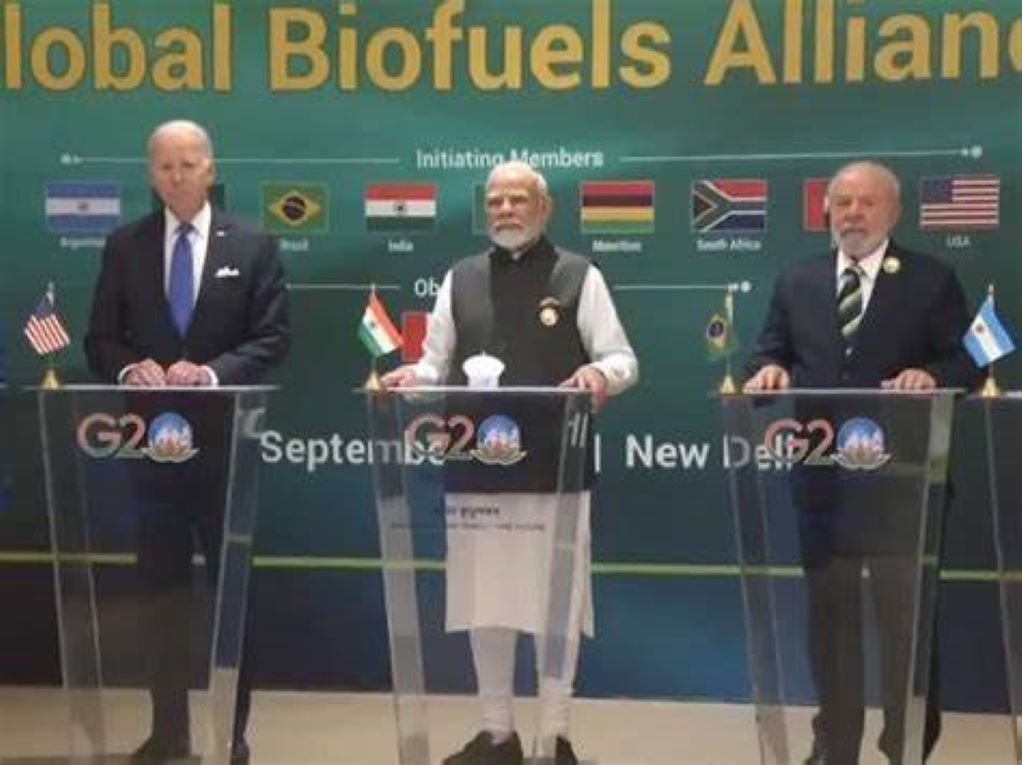Prime Minister Narendra Modi announced the launch of the Global Biofuels Alliance.
A total of 19 countries and 12 international organizations have so far agreed to join the alliance, including both G20 members and non-member countries. India, Brazil and the US are the founding members of the alliance.
The prime minister launched the alliance in the presence of the US President Joe Biden, Brazilian President Luiz Inacio da Silva, Argentinian President Alberto Angel Fernández, Italian prime minister Giorgia Meloni, Bangladesh prime minister Sheikh Hasina among others.
Apart from India, Brazil and the US, the other G20 member countries supporting the initiative are Argentina, Canada, Italy, and South Africa. Bangladesh, Singapore, Mauritius, and the UAE are the G20 invitee countries.
The non-G20 interested in joining the alliance are Iceland, Kenya, Guyana, Paraguay, Seychelles, Sri Lanka, and Uganda and Finland. Further, World Bank, Asian Development Bank, World Economic Forum, World LPG Organization, UN Energy for All, UNIDO, Biofutures Platform, International Civil Aviation Organization, International Energy Agency, International Energy Forum, International Renewable Energy Agency, World Biogas Association are the interested international and multilateral organizations.
The three founding members of alliance, the US, India and Brazil contribute about 85% of the global production and the 81% of consumption of ethanol.
China and oil producers Saudi Arabia and Russia have however decided not to be part of the alliance. With an eye on the Organization of the Petroleum Exporting Countries (Opec)-plus grouping — where both Saudi Arabia and Russia are members — the Indian-conceptualized alliance is being positioned as a global forum to help boost demand and technology transfer for the production of biofuels and enhance trade.
India is also looking at increasing its biofuel production through varied sources in a bid to cut its import dependence for fuel at a time when the ‘Opec+’ grouping has enforced successive production cuts.
The G20 Leaders’ Declaration released said that the member countries “recognize the importance of sustainable biofuels in our zero and low- emission development strategies, and note the setting up of a Global Biofuels Alliance”.
The outcome document post the final G20 Energy Transitions Ministers’ Meeting held at Goa in July had said that member-countries recognize the potential opportunity of working together for further deployment and development of sustainable biofuels as one of the strategies for advancing the energy transition.
According to estimates from the International Energy Agency (IEA), global biofuel production would need to triple by 2030 to put the world’s energy systems on track toward net zero emissions by 2050.
In its ambitious energy transition journey, India has committed to achieving carbon neutrality by 2070. India also has an ambitious biofuel roadmap. The government has advanced its target to achieve 20% ethanol blending in petrol by 2025-26 from an earlier target of 2030. The target of petrol supplies with 10% ethanol blending was achieved in June last year, ahead of the original schedule of November 2022.
Being set up at par with the International Solar Alliance, the biofuel alliance’s focus is on accelerated adoption of biofuels, creating new biofuels, setting globally recognized standards, identifying global best practices, and ensuring industry participation.
The global ethanol market was valued at $99.06 billion in 2022 and is predicted to grow at a CAGR of 5.1% by 2032 and surpass $162.12 billion by 2032.
Tags: G20 summit, Global Biofuel Alliance, PM Modi



Recent Posts
PIL Conducts First Simultaneous Cargo and LNG Bunkering in Singapore
NYK Takes Delivery of LNG-Fuelled Capesize Bulker SG Dawn
Swire Shipping joins Achilles Maritime Network to strengthen supply chain sustainability and compliance
L&T Open to Minority Stake Sale in Green Hydrogen and Ammonia Projects
Government Briefs Parliament on Oil, Gas, and Alternative Fuel Projects
Angola’s NVS Targets Green Methanol Production for Multiple Sectors
CBH Group Trials Biofuels to Cut Maritime Emissions in Grain Exports to Europe
Grimaldi Group Takes Delivery of Ammonia-Ready PCTC Grande Tianjin